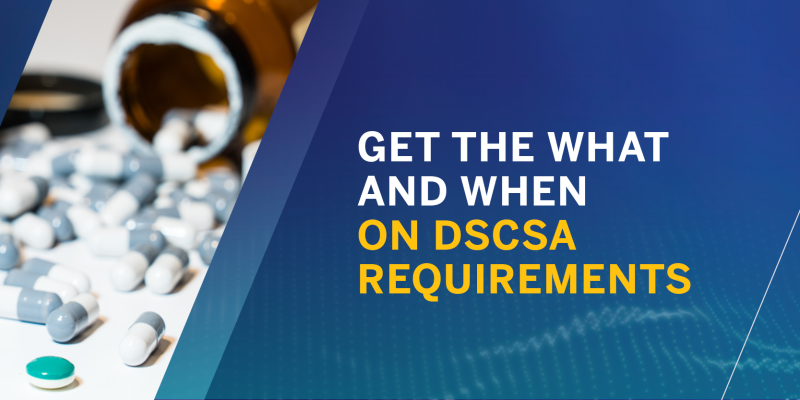
By Pam Forster, Director, Healthcare Product Compliance Solutions & Strategy:
In 2013, Congress enacted the Drug Supply Chain Security Act (DSCSA) to protect the pharmaceutical supply chain from counterfeit drugs infiltrating the U.S. market. These counterfeit drugs could lead to severe patient harm or even fatalities by depriving patients of the medications they were prescribed.
The DSCSA, enforceable by the FDA, was designed as a 10-year phased-in regulation to give the pharmaceutical supply chain ample time to plan, upgrade, and collaborate on integrating its many components. While the law was set to be fully effective in 2023, enforcement includes some nuances.
Knowing what’s already enforceable under the DSCSA, how exemptions apply, and what expectations lie ahead is crucial for trading partners in 2025.
Current DSCSA Requirements
Many DSCSA requirements are already enforceable for manufacturers, wholesalers, distributors, and dispensers/pharmacies, including:
- Product labeling and tracking
- Investigating and reporting suspect or counterfeit products
However, the requirements that took effect on November 27, 2023 introduced a new layer: electronic tracing of product ownership throughout the entire supply chain at the lowest saleable serialized product level. This applies to all transactions involving pharmaceutical products — sales, loans, or transfers between legal entities — unless they meet specific FDA-defined exceptions, such as patient-specific transfers or exempt products.
Delays and Exemptions
To allow the industry more time to implement electronic data exchange systems, the FDA granted a one-year non-enforcement "stabilization" period in August 2023, moving the enforcement deadline for the 2023 requirements to November 27, 2024.
Additionally:
- On July 12, 2024, the FDA granted a small business exemption for dispensers employing 25 or fewer licensed pharmacists and pharmacy technicians. Enforcement for these entities is delayed until November 27, 2026. Dispensers qualifying for this exemption must communicate their status to trading partners.
- On October 9, 2024, the FDA issued another exemption to specific DSCSA requirements. This exemption acknowledges the considerable progress made by many industry stakeholders and applies to trading partners that have initiated systems and processes described in the exemption document.
Who Needs to Comply?
- Trading partners not relying on the October 9 exemption or the small business exemption were required to comply with all section 582(g)(1) requirements of the FD&C Act starting November 27, 2024.
- For those relying on the October 9 exemption, timelines vary by sector. While some DSCSA requirements are already enforceable, many trading partners will need to comply with electronic serialization requirements beginning in 2025, with small business dispensers following in 2026:
- Manufacturers and Repackagers have until May 27, 2025
- Wholesale Distributors have until August 27, 2025
- Dispensers with 26 or more full-time employees have until November 27, 2025
- Dispensers with fewer than 26 full-time employees have until November 27, 2026
Check the FDA’s exemption document for more details.
Moving Forward in 2025
Acting on guidelines now will help ensure you stay on track to meet compliance milestones on time. As regulation and industry standards evolve, Inmar remains committed to supporting dispensers and other stakeholders in staying DSCSA-compliant. We continue to be a trusted partner, helping dispenser communities navigate the complexities of DSCSA while ensuring safety and efficiency in the pharmaceutical supply chain.
